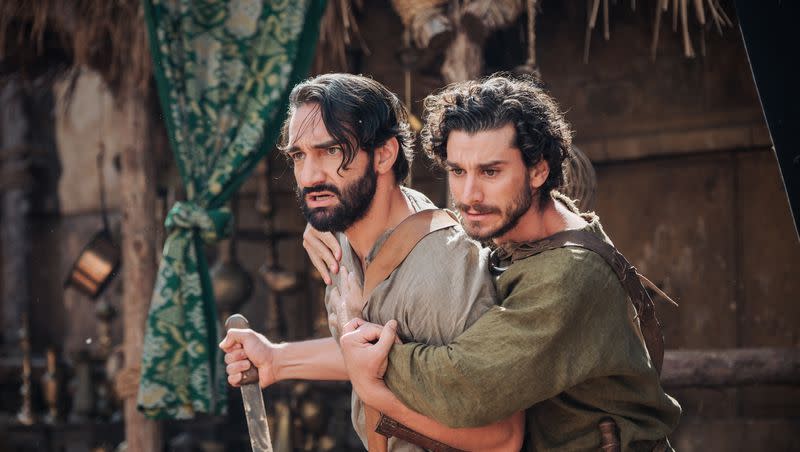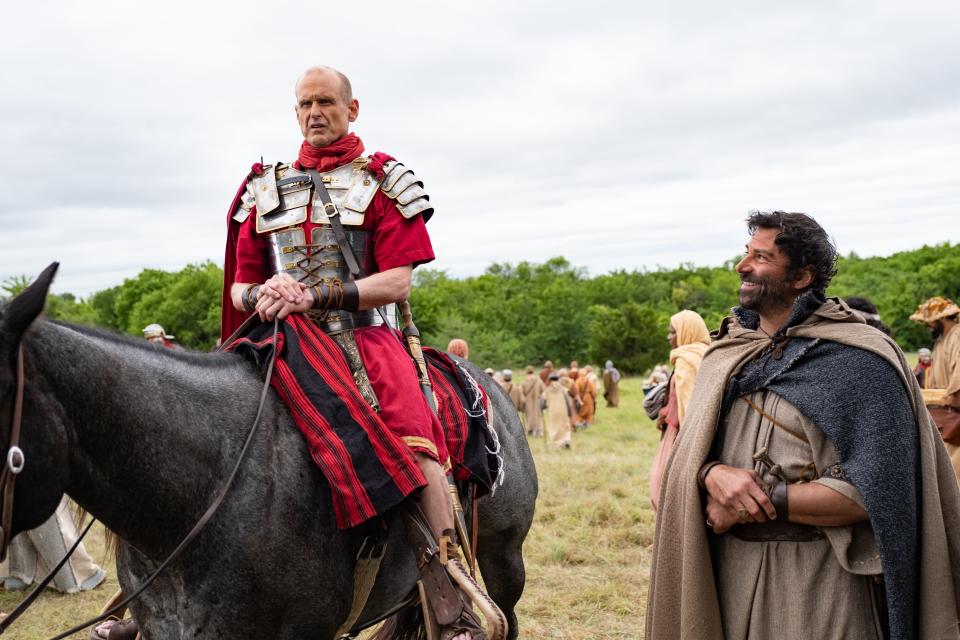Gaius and Thomas go through it in Season 4 of ‘The Chosen.’ Here’s what the actors said about it

If you’ve seen “The Chosen” Season 4, you know that the characters Thomas (Joey Vahedi) and Gaius (Kirk Woller) have interesting character arcs.
Episodes 4 to 6 came out in theaters on Thursday. That means we’re inching closer to the upcoming season finale (Episodes 7 and 8), which will release in theaters on Feb. 29.
On Thursday, the Deseret News did a video call with Vahedi and Woller to discuss all things Season 4. It must be said that there are spoilers ahead! Scroll past the picture if you’d like to read more.

Now let’s get into it.
Season 4, Episode 4 is the immediate aftermath of Ramah’s death. Thomas is grappling with grief and confronting the question of how to still have faith even after losing a loved one. The focus is squarely on Thomas and how his character will develop. Vahedi says that he loves the journey.
“I love the journey that they have him on — him being this man who is a sweet guy,” Vahedi said. “We see that a lot with Ramah. He’s a sweet genuine person who has a lot of love and compassion in heart, just doesn’t really know how to point to it sometimes, or express it.”
It’s the origin story of “Doubting Thomas.”
“I like that we take that sweetness and change it all through the lens of question, which I think will play it really nicely into his unfortunate title of ‘Doubting Thomas,’” Vahedi said.
Vahedi said he can understand why the audience was so upset when Ramah died. “I remember when I watched ‘Game of Thrones’ and saw what happened in ‘Game of Thrones,’ I was very upset as an audience member because I loved those character so much. But that made me appreciate and love the people who were able to stay and who carried that story on.”
As the season goes on, Vahedi said he thinks the audience will empathize with Thomas. “I think you’ll really empathize with the other disciples as well because it’s not just him that’s suffering. It’s everybody else. Everyone is wondering, ‘How do we move forward?’”
The character of Gaius goes through an interesting character arc, too. Woller didn’t want to spoil it and put it this way: “Gaius is walking a tightrope and that definitely comes to a head in Season 4.”
Will Gaius stay with the Romans even as they continue to oppose Jesus’ ministry or will he become a follower of Jesus in every sense?
The audience will have to keep watching to find out. More comes out about Gaius’ path in Episodes 4 to 6 than arguably ever before.
Woller said he doesn’t see his character as a villain and he talked about the universality of his character.
“I think everyone has a justified reason for why they do what they do, so the idea that Gaius is a villain or a supervillain is another thing that never really crosses my mind,” Woller said, explaining that for every character, there’s a compelling, believable reason why they do what they do.
That relatability is something Vahedi and Woller see in both of their characters and the show’s other characters.
“How cool is it that people can relate to Mary Magdalene because she is someone that has suffered trauma? How cool is it that people can relate to Matthew because he falls on the spectrum?” Vahedi said, later adding, “That’s a huge testament to the impact of the show and how regardless of what you believe or what group you’re a part of or what race or gender ... at the end of the day, it’s about the human experience.”
Woller said when he watches film, he’s always identifying with characters of all kinds.
“I think that good television, good theater, good film, good commercials is the world’s therapy,” he said. “And what I mean by that is that we are allowed to live through another life, another person, to see how they handle grief, happiness, death, love, marriage, birth. We get to experience something that we might not be able to experience in our own life and learn from it.”

